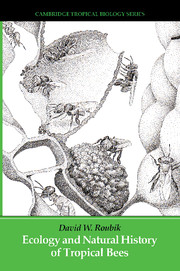4 - Community ecology
Published online by Cambridge University Press: 04 August 2010
Summary
Community ecology is a relatively new and challenging area of biology, as it attempts to explain broad patterns and correlations that can offer penetrating insights. A confounding part of this discipline is that phenomena under study have multiple explanations. To evaluate them, natural history and long-term population data are critical. Case studies of species interactions invite discussion of the rules of viable biological communities (reviews edited by Price, Slobodchikoff, and Gaud 1984; Strong, Lawton, and Southwood 1984; Shorrocks 1985; Diamond and Case 1986). Often, either competition and resources or predation and natural enemies constitute the primary set of interactions used to explain the number and type of organisms that can be found in a habitat at a given time. Yet these factors are not mutually exclusive. In a statistical sense, one must be more important than the other. In any given year or season, however, varied natural phenomena could have pervasive influence on the individuals of a population. Gathering the necessary natural history information, usually far from complete in either the fossil record or in the records compiled by biologists, forms a basis for sorting out the alternatives. At the same time, the study of mortality and fecundity patterns and their causes provides general and applicable insight. Collecting and evaluating the data stimulates appreciation of both population biology and natural history; their distinctions may gradually blur as both phases of research are more widely applied.
- Type
- Chapter
- Information
- Ecology and Natural History of Tropical Bees , pp. 313 - 389Publisher: Cambridge University PressPrint publication year: 1989



